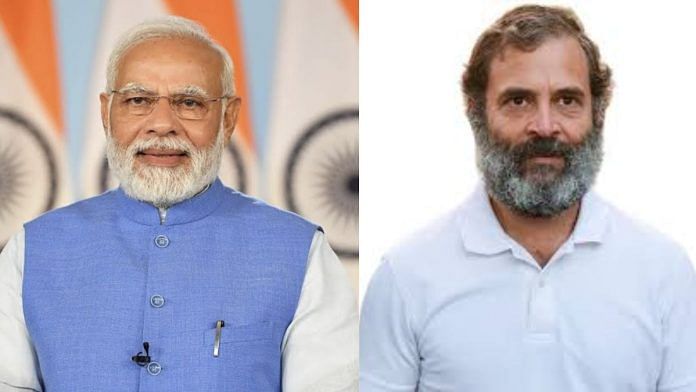Thank you dear subscribers, we are overwhelmed with your response.
Your Turn is a unique section from ThePrint featuring points of view from its subscribers. If you are a subscriber, have a point of view, please send it to us. If not, do subscribe here: https://englishdev.theprint.in/subscribe/
The success and failure of an organization — whether commercial, non-profit, or political — is only as pronounced as its leadership. While there’s ample research supporting this claim (flip through the next issue of HBR to see what I mean), not everyone agrees on where the line that defines “leadership” should be drawn. Is it the sole individual atop the hill? Or the larger group of stakeholders that make up the “top management” of an organization?
In this context, I would like to explore Narendra Modi and Rahul Gandhi as two leaders that are at important crossroads in their respective careers. The million-dollar question: Will Modi fade into obscurity while Rahul achieves his long-sought resurgence in the next few years?
In my view, this question is best answered with another question: “Will Modi manage his relative failure better than Rahul’s recent success?”.
The way BJP is organized — being a political wing of a larger organization (RSS) — gives Modi an edge. RSS is like a supervisory board of a commercial organization which sets long term direction, strategy, leadership, and its succession. RSS is better positioned to do a critical analysis ,as an outsider, of the status of BJP with its failure to achieve absolute majority on its own. We have already seen this happening in the recent speeches of RSS leaders. There are also enough RSS trained leadership in BJP who can take this analysis and spread across the party for taking corrective measures.
Modi is a clever politician. While he keeps an external image of a denier of the 2024 election outcome, inside him one can reasonably expect him to slowly change things which can re-attract more voters towards him.
Congress, on the other hand, does not have the benefit of a truly external supervisory board. The congress party is both the board and management, to use the parlance of a commercial organization. The party is making Rahul believe that the party’s success is solely due to his leadership style. This may not be entirely true. Congress’s success is a combination of anti-incumbency, coalition politics, and their messaging that BJP would bring down reservations if voted to power.
Rahul’s speeches in the parliament for obvious reasons are full of confidence and aggression. It is not clear if behind this newfound confidence there is a realization that he cannot take full credit for INDIA’s performance. Another disadvantage Rahul has is, when congress tries to become bigger, the friendly parties in INDIA will become uncomfortable and move away to their own regional stronghold where they oppose congress. Rahul does not have the political experience and maturity to walk this tight rope.
At this point, I would, hence say Modi and BJP have a head start for them to gain prominence compared to Rahul’s ability to sustain the recent success.
These pieces are being published as they have been received – they have not been edited/fact-checked by ThePrint.


